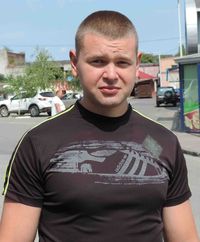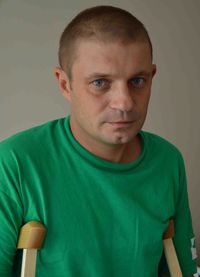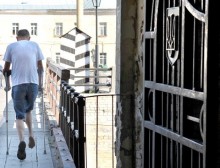“We must personally take part in bringing order to this country”
Oleksii Toroni, who returned from the war to get treatment, speaks about our soldiers’ mood
Toroni is a typical representative of the present young generation of Uzhhorod. He graduated from high school and then technical college, was drafted to serve with the Presidential Regiment, worked at a Volkswagen plant in Bratislava and for a security agency in Uzhhorod. When the Russian mercenaries invaded Ukraine, Toroni was called up in the first wave of the mobilization in early April together with 60 more of his countrymen from Zakarpattia. Having spent a month and a half at training grounds, they were sent to the anti-terrorist operation (ATO) area. Our conversation was two-stage, as we talked to Toroni for the first time in June, when the soldier was still at war, and then in September, when he was getting treatment after an injury.
We remember your brigade’s tragic loss at Volnovakha. What happened there?
 “I was lucky to be at our home base in Novoukrainka on that day. Our battalion commander Major Polinkevych, who died in the battle, had visited us on the previous day and told us that locals had approached our soldiers and warned that there would be a shelling. However, the command did not take notice. The militants carried out a massive shelling of our field camp where the unit stopped for the night at 4 a.m. As a result, 18 of our soldiers were killed, and 30 more maimed. The separatists conducted a massed fire mission with assault rifles, anti-tank grenade launchers, machine guns, mortars, MANPADS. The wounded were finished off by snipers who flanked the battle site.”
“I was lucky to be at our home base in Novoukrainka on that day. Our battalion commander Major Polinkevych, who died in the battle, had visited us on the previous day and told us that locals had approached our soldiers and warned that there would be a shelling. However, the command did not take notice. The militants carried out a massive shelling of our field camp where the unit stopped for the night at 4 a.m. As a result, 18 of our soldiers were killed, and 30 more maimed. The separatists conducted a massed fire mission with assault rifles, anti-tank grenade launchers, machine guns, mortars, MANPADS. The wounded were finished off by snipers who flanked the battle site.”
We hear a lot now about betrayal by senior officers and generals. What do you think about this?
“We are often surprised when, knowing the locations of the separatists with precise coordinates, we do not get the order to destroy the enemy. We had once 600 hostiles massed at a checkpoint and firing daily at our positions, but the order to shoot at them never came. In such situations, thoughts of treason or something else come to people’s heads quite naturally.”
Who are the people fighting for the separatists?
“It is a mixed bag. They send drug addicts and drunkards first, and, if our response is limited, their main force joins the battle, but if we respond with massed fire, they stay away.”
“DETERMINED TO FIGHT ON”
What did the locals tell you, did they support you or asked to go away?
“Some said they had done well enough without us, ‘go home, please.’ On one occasion, we stopped a bread van at a checkpoint and found a map with plotted positions of Ukrainian troops in its cabin. There are also people who are waiting for the liberation of their villages from the militants. However, most of the local people are simply intimidated by threats of armed gangsters who force them to go to war and plunder their villages, so these people just want the war to end.”
What is the mood of your comrades in the Ukrainian army?
“They are determined to fight on, but it seems that someone is still interested in prolonging the war. Had we trashed the militants recently as strongly as we did immediately after the truce ended [which Petro Poroshenko declared at the end of June. – Author], the situation would have been much better. Our forces paused after an active phase, and the militants took advantage of this and began to throw new forces into the fray.
“Overall, in my opinion, the army needs rotation. Firstly, people are extremely exhausted. Many are at the end of their tethers mentally, some are losing their minds. Secondly, all healthy men of Ukraine are sworn to defend the fatherland, not only those who have been called up during the first and second waves of the mobilization. Why some have spent six months dodging bullets and artillery fire, while others fully enjoy the benefits of a peaceful life? People should display their toughness in the Donbas, and not in the streets of peaceful towns and villages. You have to understand that if we do not defend Ukraine there, sooner or later we will have to defend it here. I think it is a great injustice that my peers from all over Ukraine are fighting, while some residents of Donbas, who have allowed this bloody mess to happen by their indifference, if not direct participation, are now quietly sitting somewhere in Zakarpattia, Lviv region or Kyiv.”
“I HAVE BOUGHT A BRITISH UNIFORM FOR 250 HRYVNIAS AT A BAZAAR”
How are Ukrainian soldiers equipped?
“The army sold us police body armor for 250 to 300 hryvnias in the early days of the ATO, but it does not do much good, because it is not designed to protect from bullets. Our government-issued uniforms are new, but of poor quality, as they fall apart after the first washing. I have bought a British uniform for 250 hryvnias at a bazaar in Uzhhorod. We are well fed, and volunteers bring aid from private citizens.”
Really, is every soldier allowed to wear any sort of uniform, whether Ukrainian, German, or British?
“Of course.”
What is the soldier’s salary?
“I got 300 hryvnias in June, but my last payment as a junior sergeant was 2,800 hryvnias in basic salary and 2,900 hryvnias in bonus. However, it applies only to those who are serving in the immediate ATO area.”
“OUR COMMANDERS TREAT US WITH FATHERLY CARE INDEED”
Do you discuss the situation in the country other than the hostilities with your comrades? What sentiments predominate?
“You know, our sentiments vary. What we all share is an understanding of the need to personally take part in bringing order to this country, without expecting someone to do it for you.”
What is your take on your commanders?
“We talk mostly with my immediate commander, a major who is a company commander of the Chernivtsi Regional Territorial Defense Battalion, and political officer of our brigade, Lieutenant Colonel Petro Marko of Uzhhorod. [The lieutenant colonel is well known in Uzhhorod following his fiery speech at the first anti-Putin rally in March. He was recently wounded near Rubizhne and is now getting treatment as well. – Author]. They treat us with fatherly care indeed, protect and instruct each soldier.”
Having got combat experience, did it occur to you to become a professional soldier?
“Prior to the ATO, I planned to sign an enlistment contract with the Marines. However, it was not to be. Should our country’s attitude to the army change dramatically, making military service a properly paid job, as it is in NATO countries, I will sign up, yes.”
P.S. In less than a month after this conversation, the 51st Guards Volodymyr-Volynsky Detached Mechanized Brigade suffered heavy losses at Ilovaisk. The Volyn guards’ base camp, where Toroni was at the time, was shelled by the Russian invaders’ Uragan rocket launchers at 4 a.m. They also hit it with Grad rockets for two days in a row and crushed with tanks. Wounded in the leg by a shell fragment and suffering from a hip joint dislocation, Toroni hid in a trench for almost a day along with his friends. They were then evacuated, the day before the base camp was destroyed, firstly to a hospital in Starobeshevo, and then to hospitals in Mariupol and Rivne. Toroni is already at home and preparing for surgery. We wish him to make a full recovery as soon as possible and have a successful civilian life.
By Vasyl ILNYTSKY, Uzhhorod
“We said goodbye to each other plenty of times”
National Guard soldier from Kherson, on the war from the inside, captivity, unity of comrades-in-arms, and readiness to fight
 The majority of Kherson National Guard soldiers from military unit No. 3056 are still prisoners of DNR militants. They were ambushed by terrorists near Amvrosiivka, Donetsk oblast. Russian hirelings used heavy equipment, mortars, machine guns, and blew up the Ukrainian fire unit. The enemy showered with intense fire. After an unequal fight, soldiers from Kherson, Mykolaiv and Zaporizhia were captured by the enemy, having no means to fight back.
The majority of Kherson National Guard soldiers from military unit No. 3056 are still prisoners of DNR militants. They were ambushed by terrorists near Amvrosiivka, Donetsk oblast. Russian hirelings used heavy equipment, mortars, machine guns, and blew up the Ukrainian fire unit. The enemy showered with intense fire. After an unequal fight, soldiers from Kherson, Mykolaiv and Zaporizhia were captured by the enemy, having no means to fight back.
National Guard Warrant Officer Anatolii Kuzovy was one of the first Kherson fighters to be released by the militants. His leg was broken during the battle. Not wishing to take care of wounded prisoners, DNR militants decided to exchange him and other wounded for their soldiers. Now Anatolii is treated at the Kherson Oblast Clinic Hospital. He has a closed fracture of a leg in several places. However, the doctors state that he will be able to walk, even though rehabilitation will take at least three months. The Day visited Kuzovy at the hospital, learned about the way he feels, talked about military actions in Donbas, his being a prisoner, and further fight with terrorists.
“I RECEIVED FRACTURES, BUT MY BOYS DID NOT LEAVE ME BEHIND”
How did the process of your departure to the ATO area take place? Did you have enough supplies?
“We were in constant combat readiness because of frequent trainings at the firing ground. We were ready for a combat mission, it did not scare us. Before departure, we were armed well, given bulletproof vests, presented by volunteers and local authorities. By the way, they saved a lot of men from lethal wounds. We went to the ATO area with the commander of our division. We occupied a height near the village of Uspenka, Donetsk oblast, dug in, and started serving at checkpoints, that is, we performed our main tasks. We did not contact the enemy’s soldiers, but were fired at by Grads three times. We survived thanks to trenches and bunkers. But we lost our armored vehicles.”
How were you ambushed?
“We lost one man after the first round of Grad fire, three more were wounded. The command decided to lead us from Uspenka to Amvrosiivka. We set out in the direction of Mariupol to join the Armed Forces divisions. We were ambushed during the retreat near the village of Olhinske. We were fired at from several types of weapons. We decided to fight and started shooting back. Soon all our trucks caught fire, men started jumping out. Some did not make it on time. Some were luckier. The thing is that the fire was so intense, you could not even look around. I jumped out and landed in a hole with one foot, that is how I got the fractures. But my boys did not leave me alone and dragged me along to a bunker. Artillery and small arms fire still continued. We said goodbye to each other plenty of times. Our ammunition load burned down in the trucks and we used everything we had on us. We had only several bullets left. Soon people with Russian accent came and set a condition: either you leave the bunker, or we fill it with grenades. We got out, because we had nothing to continue the fight with.”
How did the militants behave? Why were you released?
“We were put in buses, driven around some forests, and in the morning we ended up at a police department station in Snizhne. We were put in cells and told that now we had the status of prisoners of war. They identified themselves as ‘DNR representatives.’ But it was obvious they were not from Ukraine, one could hear a distinct Russian accent in their speech. I was taken to Donetsk soon because of my injury and got minimum medical aid there. Then thanks to the efforts of our government, OSCE, the Red Cross, and journalists, it became possible to establish a process of prisoner exchange. Militants got rid of the wounded in the first place, that is why I was among the first to be released. Other Ukrainian soldiers and I were taken to Kharkiv, and then to Kherson.”
How were you received at home?
“There was a very warm welcome, plenty of attention and care. Local authorities paid for the treatment. I feel the support of my comrades and the care of doctors every day. I am very grateful for it. It is nice that I was not left behind and forgotten.”
“ABOUT 38 OF MY COMRADES ARE STILL HELD PRISONERS. THIS CANNOT BE FORGIVEN”
What did you remember the most from captivity? How many of your men are still there?
“The worst was the low morale. It is hard to put into words. In a situation when you have no connection with your family, commanders, you just don’t know what is happening outside, you feel very depressed. Militants apply a lot of psychological pressure. Their main argument is ‘nobody needs you, nobody is looking for you, you were left behind.’ They did not feed us well – we ate only once during the two days in Snizhne. This is the war: today we win a battle, tomorrow the enemy does. But we have already smelled powder, walked under bullets, learned to fight a little. Now we are better prepared and we know more. But it is not time to relax because there are about 38 of my comrades held prisoners there. If an order comes, I am ready to go get them after I recover. This cannot be forgiven. Just understand, it is unacceptable to sit here and smile when friends who dragged me under the fire are in trouble. During this period we became something like a family, we held on to each other. Perhaps, this is the reason militants’ pressure failed. I am convinced none of my comrades lost courage. And I hope to see them soon.”
Did your attitude towards the Donbas population change?
“After talking with locals, I understood the majority does not support any kinds of ‘people’s republics’ and joining other countries. Having seen Ukrainian soldiers, our flags, people come to checkpoints literally the next day and complain about the situation created by the militants. I do not understand at all how people in their right minds, those who have suffered enough, can still support DNR. There is a group of fanatics there that seem to be obsessed with Russian propaganda. I was asked only one question while being held prisoner: ‘Why did you come here?’ An explanation that we do not bring death, that we came to the Ukrainian land to fight marauders, that we help to implement citizens’ legal rights do not work. They keep talking nonsense like that I kill their women and eat their children... It is clear that these people were hired for big money.”
Now the special status of occupied territories is being discussed. What is your opinion on that? Should we fight for Donbas at all?
“One thing interests me: who are we giving the special status to? Obscure republics? Militants? Bandits in uniform who were brainwashed, given money, and they came to talk about some separation? Did anyone ask the people of Donbas who came to complain to us about this status? I am sure they want peace and normal life, but not the DNR. Clashes continue now, people continue being brainwashed because Ukrainian TV channels do not work there. The fight must be carried on. Donbas is Ukrainian land. It has been and it must be. We cannot give in to all kinds of gangs. If we give in once, they will grow stronger and start thinking about capturing new territories. They only bring death and destruction. And I do not want this in Kherson.”
P.S. Those willing to help Anatolii Kuzovy to recover faster can send financial aid to his mother’s bank card.
Oshchadbank: 5167 4900 2913 7305
Kuzova Natalia Mykhailivna
By Ivan ANTYPENKO, The Day, Kherson







